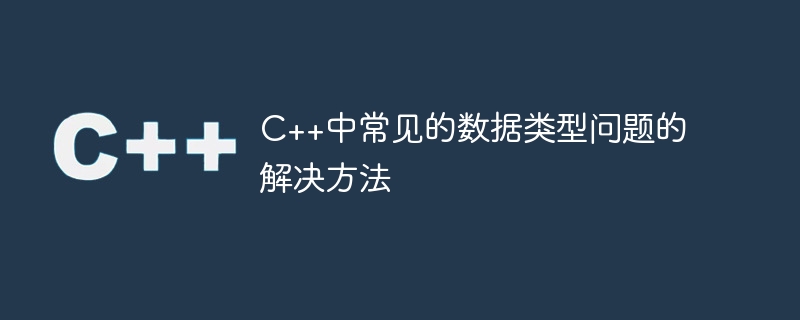

Solutions to common data type problems in C
Introduction:
In C programming, problems dealing with different data types are very common. Different data types have different characteristics and uses, however, we often encounter some problems when dealing with different types of data. This article will introduce some solutions to common data type problems in C and provide specific code examples.
1. Integer overflow problem
Integer overflow refers to what happens when an integer exceeds the range that its data type can represent. When working with integers, we should be aware of the range limitations of data types and be careful with operations that may cause overflow.
The following is a sample code that demonstrates the solution to the integer overflow problem:
#include <iostream>
#include <limits>
int main() {
int a = std::numeric_limits<int>::max(); // 最大值
int b = 1;
if (a > std::numeric_limits<int>::max() - b) {
// 运算会导致溢出
std::cout << "整数溢出" << std::endl;
} else {
// 没有溢出
std::cout << "没有溢出" << std::endl;
}
return 0;
}In the above code, we use std::numeric_limits<int>::max( )Function to get the maximum value of a specific data type. Before performing calculations, we first determine whether the operation will cause integer overflow, so as to correctly handle possible overflow problems.
2. Floating-point number precision issues
Due to the characteristics of the internal storage representation of floating-point numbers, precision loss or inaccuracy may occur when using floating-point numbers for calculations. This problem may cause calculation results to be inconsistent with expectations.
The following is a sample code that demonstrates the solution to the floating point precision problem:
#include <iostream>
#include <cmath>
int main() {
double a = 0.1;
double b = 0.2;
double c = 0.3;
if (std::abs(a + b - c) < 1e-10) {
// 计算结果近似等于预期值
std::cout << "结果正确" << std::endl;
} else {
// 计算结果不等于预期值
std::cout << "结果不正确" << std::endl;
}
return 0;
}In the above code, we use the std::abs() function to calculate the absolute value and set a precision threshold. By comparing the difference between the calculated result and the expected value with the accuracy threshold, we can determine whether the calculated result is consistent with expectations.
3. String operation issues
In C, string is a common data type. However, when operating on strings, we may encounter some common problems, such as string length exceeding the limit, string concatenation, etc.
The following is a sample code that demonstrates the solution to the string manipulation problem:
#include <iostream>
#include <string>
int main() {
std::string str1 = "Hello";
std::string str2 = "World";
std::string result = str1 + " " + str2;
std::cout << result << std::endl;
return 0;
}In the above code, we use the operator to splice two characters string. By using the functions and operators provided by the std::string class, we can easily perform string operations.
Conclusion:
In C programming, problems dealing with different data types are common. Solutions to different problems can help us take full advantage of the power of C and avoid potential errors and risks. I hope this article can help readers better solve common data type problems in C and apply them in actual programming.
The above is the detailed content of Solutions to common data type problems in C++. For more information, please follow other related articles on the PHP Chinese website!
 What are the data types?
What are the data types?
 What are the differences between c++ and c language
What are the differences between c++ and c language
 Recommended learning order for c++ and python
Recommended learning order for c++ and python
 Cost-effectiveness analysis of learning python and c++
Cost-effectiveness analysis of learning python and c++
 Is c language the same as c++?
Is c language the same as c++?
 Which is better to learn first, c language or c++?
Which is better to learn first, c language or c++?
 The difference and connection between c language and c++
The difference and connection between c language and c++
 C++ software Chinese change tutorial
C++ software Chinese change tutorial




